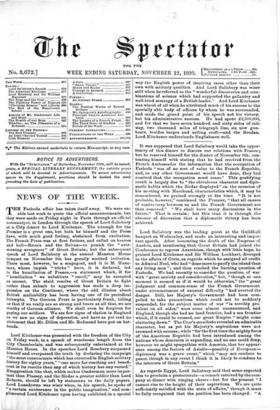Lord Salisbury was the leading guest at the Guildhall banquet
on Wednesday, and made an interesting and impor- tant speech. After lamenting the death of the Empress of Austria, and mentioning that Great Britain had joined the Conference to repress Anarchism, though with little hope, he praised Lord Kitchener and Sir William Lockhart, diverged to the affairs of Crete, as regards which he assigned all credit to Admiral Noel, who had" done more to pacify the island than any living man "; and then reached the burning question of Fashoda. We had recently to consider the question of war with "great anxiety and consideration," but, "though at one moment it seemed as if it would be otherwise," the " great judgment and common-sense of the French Government under circumstances of unusual difficulty "had averted the danger. Still, her Majesty's Government had been com- pelled to take precautions which could not be suddenly suspended, for the subject matter of war "is terribly pre- valent on all aides," wars come almost unannounced, and England, though she had no land frontier, had a sea frontier which, if it could be crossed, our great Empire "might come clattering down." The Czar's manifesto revealed an admirable character, but as yet his Majesty's aspirations were not crowned with success ; while "for the first time the mighty force of the American Republic had been introduced among the nations whose dominion is expanding, and no one could deny, however we might sympathise with America, that her appear- ance among the factors of Asiatic—possibly of European— diplomacy was a grave event," which "may not conduce to peace, though in any event I think it is likely to conduce to the interests of Great Britain."






































